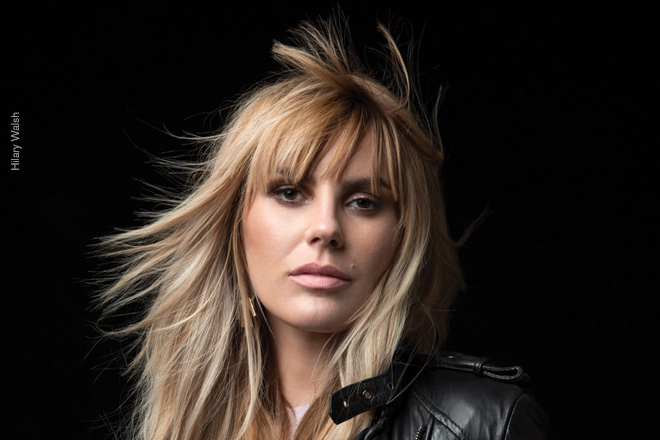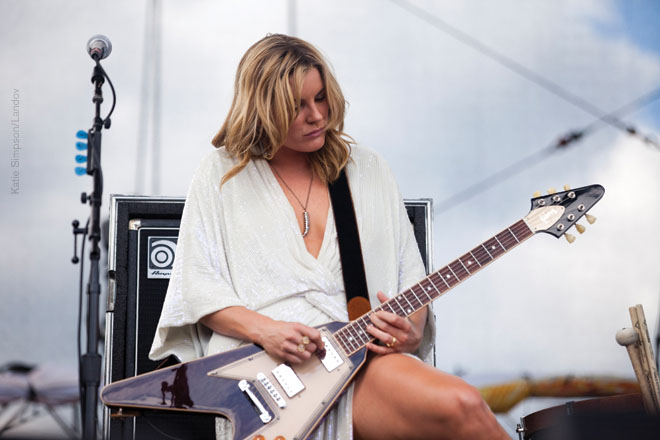 GRACE POTTER
GRACE POTTER
On her solo set, the rocker is happy her pop roots are showing
Taking a sharp musical detour, Grace Potter—frontwoman for Grace Potter and the Nocturnals for more than a decade—has swapped her trademark jam-band sound for pop on her new solo album, Midnight. The change may seem drastic to fans of the Nocturnals’ rootsy rock, but understandable when you discover the pop classics that were among the staples Potter was raised on. “Lionel Richie’s ‘All Night Long,’ that was my jam,” she says with a laugh.
The new direction developed over several months of songwriting in Potter’s native Vermont, and then continued at L.A.’s Barefoot Recording Studio with its owner Eric Valentine—whose production credits include Slash, Keith Urban and the Madden Brothers—at the helm. During the 1960s and ’70s, the studio, then named Crystal Industries Recording Studio, was a premier facility in Southern California where Barbra Streisand, Jimi Hendrix, Eric Clapton, Marvin Gaye, the Jackson 5, James Taylor and many others recorded.
Along with Valentine, Potter and her husband, Nocturnals’ drummer Matt Burr, formed the core creative group for the album. Eventually Potter added various guests, including former Queens of the Stone Age bassist Nick Oliveri, singer-songwriters Audra Mae and Rayland Baxter, and Noelle Scaggs from Fitz and the Tantrums.
Midnight isn’t Potter’s first record without the Nocturnals handle, and it’s not her first foray into pop territory. When she was 19, she cut the EP Red Shoe Rebel, which included covers of songs by Cyndi Lauper and the Police. “Nobody ever heard it, but it got me into college,” she says. The new set of tunes with keen pop hooks finds Potter’s songwriting has turned up, as she might say, “to 11.” Potter might be rattling her cage, but she always knew it wasn’t a locked one.
Was the new sound deliberate?
Absolutely, that was on purpose. I was really excited to explore new sonic terrain. I knew, even from the demos I was making a year and a half ago, that I wanted something different.
Rock to club pop, that’s a big leap.
It is a leap, but if you listen to my records, I’m always jumping around. This is the music that inspired me as a kid, and this is a tip of the hat to that. I went back to my record collection I had when I was a 6-year-old jumping about the house singing into a hairbrush. And that was Blondie, Bowie, Bob Dylan, the Beatles, the Cars and the Kinks. It’s like the Kinks go Muswell Hillbillies acoustic from “Lola”! Bob Dylan going electric, Bowie reinventing himself on every record, Blondie going disco—I didn’t think about it until I started going through all this music that inspired me when I was younger.
How did you start the creative process?
I was combining specific sounds I had never used before, just to challenge myself. The more I followed the music, the more it changed what I was writing—and I felt a deep urgency to embrace the challenge and follow the muse down this new road.
This isn’t a Nocturnals record. Did the change in style affect that choice?
Well, it was supposed to be a Nocturnals record, and it took me a long time to accept that it wasn’t going to be that. I was clinging to this loyalty—this feeling of my safety, because that’s my team. The Nocturnals was my wolf pack. It wasn’t even intentional; it slowly evolved over many months—and even after that. But eventually I had to admit the sound was clearly coming from a singular voice.
Why choose Eric to produce?
I didn’t choose him, I think the universe chose him. It was like I say in the liner notes, our molecules just got smooshed together. There were a lot of people urging us to work together in his world and in mine. People suggested it would be a cool combination, and they were right. The first day I met him, the first day I walked into his studio, Barefoot, I looked around and there were gadgets and gear everywhere. It was his day off, and his idea of a day off was soldering parts and taking apart amps. I thought, OK, we’re going to get along great. And he was barefoot, too—it was perfect.
 Did you work well together?
Did you work well together?
It was really wonderful. He also builds his own gear, and that added to the experience. He’s had 20 years of dialing into his sound and getting his equipment to do what he wants it to do. I got to benefit from many years of him exploring and experimenting with his own gear.
How was this recording process different from other albums?
At first, it was not different at all. I’d always been afraid of the studio, and I came to this experience similarly terrified. I think about the studio as brain surgery and the tour as finger painting. One has always come much easier for me than the other, and I’m sure you can guess which one. The one thing I learned from this record is patience. Eric takes his time—he works and reworks ideas, he records and re-records sounds, he plays tracks forward then plays them backward. It goes on and on. And that exploration and being still and being patient, and actually enjoying the studio, were a big change for me.
Have any “We nailed it” moments?
Totally! I always wonder that about other bands, because I’d never had those visceral moments. For me it had always been like pulling teeth in the studio. I finally had that experience, and it was the first song we worked on.
Which song was that?
It was “The Miner.” This was deep into the days of preproduction, so we’d been going through all my demos and deciding what we wanted to record. It was Matt, Eric and me in the studio. Matt was playing drums and Eric was maybe playing bass. We tracked four takes and he played take two. The moment I heard the sounds coming out of the speakers I was like, “Holy crap.” At that moment I thought, “We picked the right producer, and this sounds exactly like I wanted it to sound—which is completely different from anything we’ve tried before.”
How was the experience of working with a core of three?
In the studio when I’m writing, I’m very, very private. I usually close the door, and I want to be left alone. I want to come up with my ideas and boil them down, and then present it. Matt knows that, but Eric had to learn it very quickly. I’m like, “F–k off, I’m working on the bridge.”
But then something changed?
What was interesting was I opened up and stopped saying that. I started to engage in the collaborative experience, because it was just us in the room, and because there was so much trust and excitement. It was this effortless core band that was the three of us. It led to this fruitful experience where I was working faster, writing faster, and we got it down on tape really quickly. Some of those demos ended up intact on the record, just augmented with parts. It was a different creative experience than any I’d been through.
–Linda Laban



comment closed